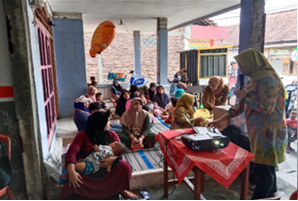ENHANCING MOTHER’S KNOWLEDGE OF COMMUNITY-LED TOTAL SANITATION PRACTICES THROUGH HEALTH EDUCATION INTERVENTIONS IN JUMPUTREJO VILLAGE, SIDOARJO

Downloads
Introduction: The report shows a decrease in stunting prevalence at the national level by 6.4% over 5 years. The problem of stunting in the future directly affects prospective mothers. The aim of health education is to increase the knowledge of mothers of stunted infants and toddlers about environmental factors as the cause of stunting.
Methods: The method of implementation in the health education program is through providing knowledge on stunting to mothers of stunted babies and toddlers in the Jumputrejo Village. The participants are mothers of infants and toddlers in Jumputrejo Village, totaling 18 people. The method for education to increase the knowledge of mothers of stunted infants and toddlers about personal hygiene, mothers of stunted infants and toddlers about environmental sanitation, and increase the knowledge of mothers of stunted infants and toddlers about environmental factors that cause stunting. Variables of this community services are knowledge before and after giving health education. Instrument of this study using questionnaire and data analysis using t test.
Results: The knowledge increase before and after giving assistance, counseling, and health education about community-based total sanitation. The results of community service found that there was a difference between the knowledge pretest and post-test with a significance of 0.000.
Conclusion: Knowledge about community-based total sanitation increased because they received proper education, awareness campaigns, and hands-on training on sanitation practices. Mothers of young children received health education, and afterward, community-led sanitation was covered through a question-and-answer format. Further evaluation can be done to measure the extent to which the increase in knowledge brings changes in the sanitation behavior of the local community and the prevention of stunting.

This work is licensed under a Creative Commons Attribution 4.0 International License.
Authors who publish with Jurnal Pengabdian Masyarakat dalam Kesehatan agree to the following terms:
The journal allows the author to hold the copyright of the article without restrictions.
The journal allows the author(s) to retain publishing rights without restrictions
The legal formal aspect of journal publication accessibility refers to Creative Commons Attribution (CC BY).
Authors retain copyright and grant Jurnal Pengabdian Masyarakat dalam Kesehatan the right of first publication with the work simultaneously licensed under a Creative Commons Attribution 4.0 International License that allows others to remix, adapt and build upon the work with an acknowledgment of the work's authorship and of the initial publication in Jurnal Pengabdian Masyarakat dalam Kesehatan.
- Authors are permitted to copy and redistribute the journal's published version of the work (e.g., post it to an institutional repository or publish it in a book), with an acknowledgment of its initial publication in Jurnal Pengabdian Masyarakat dalam Kesehatan.
Jurnal Pengabdian Masyarakat dalam Kesehatan requires a formal written declaration and transfer of copyright from the author(s) for each article published. We, therefore, ask you to complete and return this form, retaining a copy for your own records. Your cooperation is essential and appreciated. Any delay will result in a delay in publication.

JPMK by Unair is licensed under a Creative Commons Attribution 4.0 International License.










